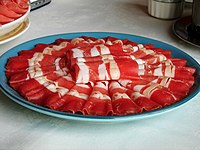
Photo from wikipedia
The meat freezing, as a method of preservation, aims to maximize the storage period with preserving the quality and nutritional value of the product. However, freezing causes certain changes in… Click to show full abstract
The meat freezing, as a method of preservation, aims to maximize the storage period with preserving the quality and nutritional value of the product. However, freezing causes certain changes in the foodstuff. These changes are the result of ice formation and lead to a change in meat quality after thawing. The aim of this paper was to examine the effect of freezing rates on the physicochemical properties of pork meat (M. Longissimus dorsi). The meat samples were frozen at 10 different rates and after 24 hours of storage at -18?C, thawed at +4?C. Samples frozen at the lowest freezing rate (0.23 cm/h) had the lowest water content (72.02%), while for the samples frozen at the highest rate (1.43 cm/h), significantly higher (p<0.05) water content was recorded (73.85%). The protein content ranged from 23.34% (rate 0.50 cm/h) to 23.76% (rate 1.43 cm/h). The increase in freezing rates from 0.23 cm/h to 1.43 cm/h statistically significantly (p<0.05) affected the increase in the pH value (from 5.41 to 5.72). By measuring water holding capacity (WHC) the least amounts of released liquid (2.27 cm2 and 2.23 cm2) were recorded at higher freezing rate (1.00 cm/h and 1.43 cm/h, respectively). The highest thawing loss was determined in pork samples frozen at slower rate (0.23 cm/h) (3.61%).
Journal Title: Acta Periodica Technologica
Year Published: 2019
Link to full text (if available)
Share on Social Media: Sign Up to like & get
recommendations!